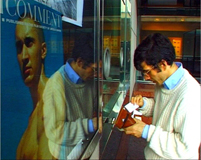Cinemania (Angela Christlieb & Stephen Kijak, 2002)
 During the closing credits of the Cinemania, a German documentary that follows five obsessive
cinephiles around New York City to investigate their extreme bond with the
movies, the directors include sound bites of the subjects criticizing the film
that just finished. One of these forthright characters complains about the
filmmakers’ unfortunate decision to shoot on DV. Another participant comments
on the obvious focus on content over form in the documentarians’
process. Obviously, a certain amount of filmgoing sharpens one’s critical
senses, because those two grievances would be my chief critiques of what’s
otherwise an enjoyable look at the almost frightening grip that cinephilia has
on these people’s lives.
During the closing credits of the Cinemania, a German documentary that follows five obsessive
cinephiles around New York City to investigate their extreme bond with the
movies, the directors include sound bites of the subjects criticizing the film
that just finished. One of these forthright characters complains about the
filmmakers’ unfortunate decision to shoot on DV. Another participant comments
on the obvious focus on content over form in the documentarians’
process. Obviously, a certain amount of filmgoing sharpens one’s critical
senses, because those two grievances would be my chief critiques of what’s
otherwise an enjoyable look at the almost frightening grip that cinephilia has
on these people’s lives.
 The five movie fans that the movie tracks are certainly a
noteworthy bunch, and it’s to the filmmakers’ credit that they picked out
individuals that are at least recognizable at sight to anyone that frequents the
various local repertory theaters. Learning more about them is, to varying
degrees, fascinating in the clichéd way that staring at a car wreck is. Take
for example Bill, a middle-aged man who timed his move to New York City to
coincide with a Fassbinder retrospective. He notes that he hasn’t had sex in
many years and then calls film “a substitute for life.” Seemingly like all
of the subjects here, he isn’t romantically involved, and when he’s shown
placing an obscenely long personal ad, about ninety percent of its length
details his filmgoing habits. Unemployed during the period the documentary was
made, he makes the observation that he’s sacrificed his career goals to be
able to attend the movies more frequently and frets about how the impending end
of his unemployment benefits might prove detrimental to his screening habits.
It’s revealed that none of them has a conventional job. Jack, the youngest of
the group at just over thirty, lives off of an inheritance. The other three
members of the group collect disability of one form or another. The common theme
between the members is that their fixation seems to provide a diversion from the
real world. They all seem aware of this to some extent, but there are times when
their distinctions between reality and filmic fantasy feel disturbingly blurry.
The five movie fans that the movie tracks are certainly a
noteworthy bunch, and it’s to the filmmakers’ credit that they picked out
individuals that are at least recognizable at sight to anyone that frequents the
various local repertory theaters. Learning more about them is, to varying
degrees, fascinating in the clichéd way that staring at a car wreck is. Take
for example Bill, a middle-aged man who timed his move to New York City to
coincide with a Fassbinder retrospective. He notes that he hasn’t had sex in
many years and then calls film “a substitute for life.” Seemingly like all
of the subjects here, he isn’t romantically involved, and when he’s shown
placing an obscenely long personal ad, about ninety percent of its length
details his filmgoing habits. Unemployed during the period the documentary was
made, he makes the observation that he’s sacrificed his career goals to be
able to attend the movies more frequently and frets about how the impending end
of his unemployment benefits might prove detrimental to his screening habits.
It’s revealed that none of them has a conventional job. Jack, the youngest of
the group at just over thirty, lives off of an inheritance. The other three
members of the group collect disability of one form or another. The common theme
between the members is that their fixation seems to provide a diversion from the
real world. They all seem aware of this to some extent, but there are times when
their distinctions between reality and filmic fantasy feel disturbingly blurry.
 One has to sometimes question whether the filmmakers behind
Cinemania are snickering at their subjects. Though the final scene in the
movie shows the cast members viewing a rough cut of the documentary and
generally responding with approval, there’s a definite streak running
throughout that encourages the audience to laugh as these hardcore movie mavens
are contrasted with “normal” people. Such instances are somewhat outweighed
by the affectionate tone that’s applied to the discussion of their
eccentricities and the filmmakers’ generous inclusion of the participants’
unconvincing arguments against a prioritization of the real world over the
celluloid one. Still, there’s no escaping the feeling that the longer that any
of the cinephiles appears on screen, and the more of their personality quirks
are revealed, the worse they come off. The most potentially shocking moments
occur when their homes, which are either compulsively organized or horribly
chaotic (I can’t quite tell which), are shown. Since these scenes present an
environment that the editorial process can’t elide or much enhance, their
presence goes a long way toward making it easy to dismiss concerns that the
behavior of the participants is being unfairly exaggerated. It’s telling that
probably the most enjoyable moment in the documentary is a positive one, which
shows two of the participants as they giggle over the uproarious ending of The
Smiling Lieutenant. It’s equally telling though that the most vividly
rendered story details Roberta’s expulsion from MOMA (since rescinded) and
suggests a potential danger in such extreme behavior. For those five minutes of
absurdity, the quirkiness almost resembles a cautionary tale for budding
cineastes like myself.
One has to sometimes question whether the filmmakers behind
Cinemania are snickering at their subjects. Though the final scene in the
movie shows the cast members viewing a rough cut of the documentary and
generally responding with approval, there’s a definite streak running
throughout that encourages the audience to laugh as these hardcore movie mavens
are contrasted with “normal” people. Such instances are somewhat outweighed
by the affectionate tone that’s applied to the discussion of their
eccentricities and the filmmakers’ generous inclusion of the participants’
unconvincing arguments against a prioritization of the real world over the
celluloid one. Still, there’s no escaping the feeling that the longer that any
of the cinephiles appears on screen, and the more of their personality quirks
are revealed, the worse they come off. The most potentially shocking moments
occur when their homes, which are either compulsively organized or horribly
chaotic (I can’t quite tell which), are shown. Since these scenes present an
environment that the editorial process can’t elide or much enhance, their
presence goes a long way toward making it easy to dismiss concerns that the
behavior of the participants is being unfairly exaggerated. It’s telling that
probably the most enjoyable moment in the documentary is a positive one, which
shows two of the participants as they giggle over the uproarious ending of The
Smiling Lieutenant. It’s equally telling though that the most vividly
rendered story details Roberta’s expulsion from MOMA (since rescinded) and
suggests a potential danger in such extreme behavior. For those five minutes of
absurdity, the quirkiness almost resembles a cautionary tale for budding
cineastes like myself.
* * *
04-17-03
Jeremy Heilman